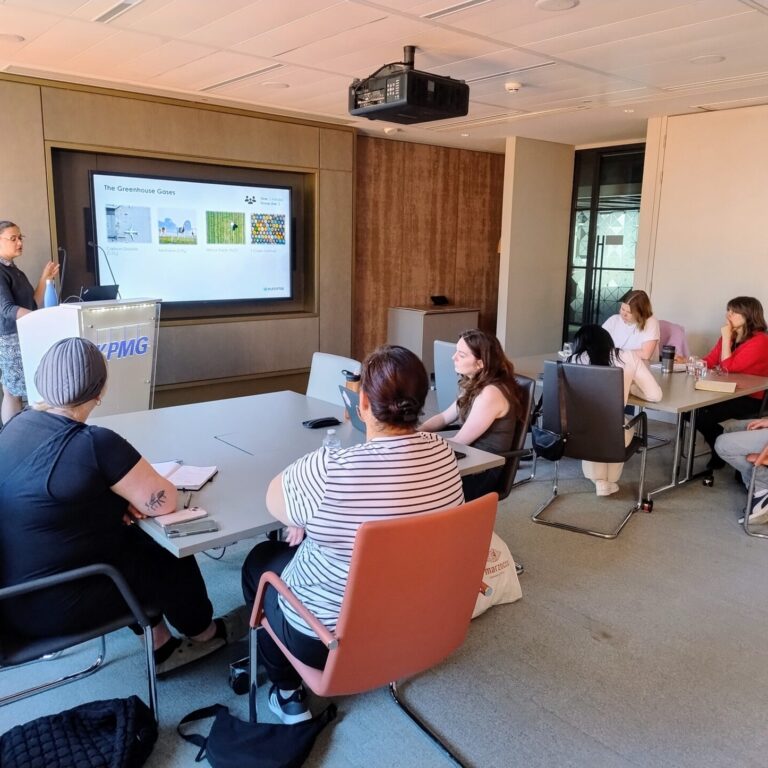Getting Started: First steps toward climate action
Taking the first step toward climate action can be daunting especially for small organisations. That’s why we launched the Getting Started programme: to provide clear, supportive guidance to help businesses begin their sustainability journey. On 28 April, we held the first session of three sessions.
The initiative has been possible due to the generous backing of Redcliffe & Temple and City Centre BIDs, who are committed to supporting businesses in the BID areas with reducing their impact on the environment, and developed and delivered with our consultancy partner Eunomia.
Participating organisations ranged in sizes and sectors, from local coffee roaster Extract Coffee, architects Spratley & Partners, nursery providers Raised In and property consultants DJ Foley.
The first session focused on jargon busting and demystification. This laid the groundwork for the next steps, enabling participants to feel informed, empowered and motivated to take action.
Here are the key takeaways:
Why climate science matters
- Empowering staff with carbon literacy is an excellent first step toward effective climate action. By understanding the core concepts, it empowers people and fosters motivation and a sense of shared responsibility.
- The word ‘carbon’ is often used to talk about greenhouse gases in general, and it’s important to take into account all greenhouse gases when looking at your organisation’s footprint, not just carbon dioxide. Other gases such as methane and nitrous oxide have a much higher global warming potential.
- Human activity has raised the amount of carbon dioxide in the atmosphere by 50% in the last 200 years, with one of the major impacts being a significant rise in temperature.
How the climate crisis affects us all
- Some of the impacts of temperature rise are melting ice, rising sea levels, more extreme weather, increased forest fires, decreased biodiversity, risk to water, damaged infrastructure, increased floods, impact on food security, greater migration, and climate conflict.
- The climate crisis also causes a risk to business, with the cost of climate change in the UK estimated to be between 3 – 8% GDP by 2050. It can cause decreased staff productivity, risks to business sites, e.g. from flooding or extreme weather events, disruption to supply chains, risks to finance, insurance and investment, and risks due to water scarcity.
- It’s important to understand that the climate crisis is impacting everyone, everywhere. For example, the price of coffee has risen significantly due to recent droughts in different parts of the world. It is not something that is happening elsewhere.
- The impacts will increasingly be felt in Bristol, with predictions of hotter summers, heavier rainfall in winter and more storms having an impact on people, nature and infrastructure.
- Although this can feel difficult and depressing, it is important to remember that as a species we are completely in control of our own fate. Whether we avoid the most extreme impacts of the climate crisis is in our hands. This can be empowering!
- And also, that one local authority, or one business, can make a difference, by having a knock-on effect on others. For example, Bristol City Council declared a climate emergency in 2018, and this led to a domino effect of other councils, businesses and institutions doing the same. Organisations can also have an impact on their customers, clients and suppliers.
- The truth of the situation we find ourselves in can be motivating, but it can also be demotivating. It is important to think how to pitch it for whoever you’re trying to influence.
The co-benefits of climate action
- Co-benefits allow you to solve multiple objectives simultaneously. This makes for a stronger business case, can bring increased reputational benefits, enables more buy-in (from investors, staff, suppliers etc) and helps unlock funding. For example, by introducing a cycle to work scheme, this doesn’t just lower emissions, but can also lead to better health for staff and improved air quality, and in the longer term contribute to reduced sick leave and higher productivity.
- A co-benefits approach is particularly beneficial for climate action, which often has narratives around sacrifice and cost. Identifying co-benefits can emphasise how climate action can bring improvements for your organisation and staff.
- Co-benefits for organisations could include better staff retention, improved staff wellbeing, the ability to recruit the best staff, access to funding, attracting more customers, improved business resilience, reduced energy costs and positive reputation.
- With a co-benefits approach, it is really useful to think about who you are trying to influence, to work out what co-benefits might influence them.
- Useful questions to ask yourself, and keep coming back to are:
- What issues are most important to you, your business and your suppliers/customers?
- How could the co-benefits approach be used to support climate action in your business?
- What are your business drivers for developing a carbon footprint and climate action plan?
“I really enjoyed how the session was linked to practical actions. It was great that the session moved from the theory of climate change to how you can use the knowledge to make change.”
Katharine O’Dwyer, Sustainability and Compliance Lead, Extract Coffee
Looking ahead: building a carbon footprint
We’re excited to see what comes next as participants begin building their carbon footprints, and we hope more organisations will join us on this journey. Stay tuned for updates, resources, and ways you can get involved.
Further reading and tools:
- A go-to resource for climate science is the IPCC, which offers a wide range of summary reports. The latest can be found here
- State of the UK Climate 2023 from the Met Office
- Climate Change and the Future of Humanity video (to understand impacts)
- Our Climate Action Programme has loads of free, practical resources on a range of topics
Share to
